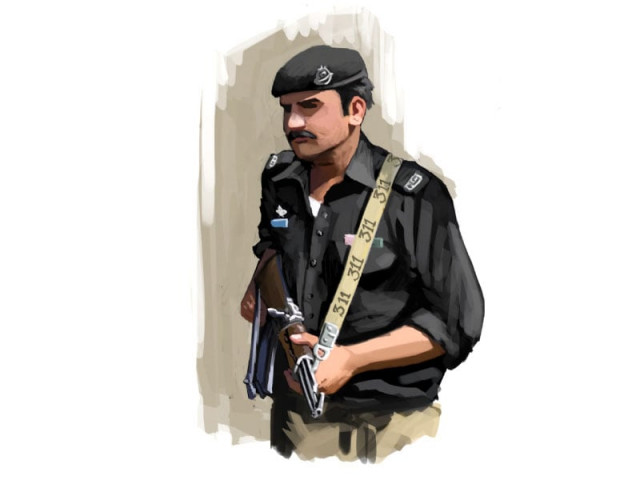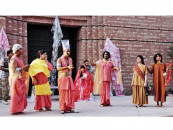No licence to kill: Penal code section offers relief
Law enforcers in upper Sindh have devised a legal mechanism to deal with perpetrators of honour killings.

Law enforcers in upper Sindh have devised a legal mechanism to deal with perpetrators of honour killings. ILLUSTRATION: JAMAL KHURSHID
On August 25 at 7:30 pm, she lay in a pool of blood in a date garden in a remote part of Sindh. As Shabana* breathed her last, she was next to the man she loved most. Her alleged ‘crime’ was that she had left her home and family to get married to someone of her own choice. The man who killed her and her husband was none other than her brother who pulled the trigger in the name of honour.
For exercising her right to choose a husband, Shabana, like many other Pakistani women, was accused of ‘dishonouring’ the family name. The ritualistic murder claimed two young lives.
Yet, there is light at the end of the tunnel. It is a hope for justice, because Abdul Raheem Sheerazi, ASP Khairpur, who was officer in charge of this case, countered the possible misuse of the Qisas and Diyat laws by using Pakistan Penal Code’s section 311.
311 – The way out
The legal system in Pakistan allows the choice to the family or heirs of the deceased to apply Qisas or Diyat laws in a way that the culprit ends up being forgiven.
But through Section 311, there is a way out. The 311 amendment was specially formulated to fight the menace of criminals going free in honour killings.
The focal person for Sukkur Police, Shaukat Abbasi, has remained active in handling such cases. “Whenever we come across a crime that has even a hint of being an honour crime, we register the state as the wali [guardian].” Through this, the discretion of accepting the pardon of the victim’s family or not is left up to the judge.
A case in point happened at Bagerji in Sukkur division, when a 13-year-old married girl was brutally tortured and killed by her family members on the pretext of running away to marry another boy. In this case, the victim’s mother was the wali and she tried to use her right to forgive to protect the perpetrators. The police stepped in and made sure the criminals did not go scot-free.

Training the police
In the year 2010, the National Assembly’s former speaker, Fehmida Mirza called a seminar in Karachi. People like the former Sindh IG, Justice Nazir, Advocate General. Yousuf Leghari, along with many police high-ups, recommended the use of section 311 in honour killing cases. The seminar expedited training police personnel to put it to effective use.
The Karo Kari Cell was formed in the late ‘90s. After the United Nations Development Programme (UNDP) led a campaign in collaboration with the Sindh Police, the cell was transformed into the Violence Against Women Cell in 2011. Under the UNDP-led programme, at least 3,000 police personnel were given training on women’s rights and how to go about cases pertaining to women.
Law games
The Qisas and Diyat Laws Ordinance (1990) was devised on the insistence of the Shariat Appellate Bench of the Supreme Court. The ordinance covers all kinds of offenses against the human body. The law allows room for compensation or compromise between the aggrieved and victim parties. The law in itself is not discriminatory; however, it is somehow misused in honour crime cases.
Nafisa Shah, a parliamentarian holding a doctorate in Honour Killing in Pakistan, said that almost all the cases are reported to the police but because the community is a direct participant in the crime, evidence is never brought up. She told The Express Tribune that “The law is not a loophole but it certainly is a patron to the crime and forms no deterrence to it.”
The Amendment to Criminal Law (Amendment) Act 2004 allows the state to be the victim’s wali (guardian) and has also removed the possibility for the murderer to be the wali of the victim, according to Maliha Zia Lari, a high court advocate and a women’s rights activist. The amendment has brought about somewhat significant changes in the PPC and CPRC both, which has also enabled appointment of high ranking police officers in the investigation of both honour crimes and zina (adultery) related crimes.
A veteran gender expert and an author, Fouzia Saeed, said that the law is not only misused for women but also creates an unfriendly environment, where via private settlements, an offender of the law is paid homage and is allowed to live life like an innocent.
Published in The Express Tribune, September 18th, 2013.



















COMMENTS
Comments are moderated and generally will be posted if they are on-topic and not abusive.
For more information, please see our Comments FAQ